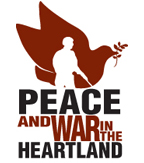
- Donate
- Springboard for the Arts
- See the Play
- "Peace Crimes: The Minnesota 8 vs. the war"
- at Rarig Center
- Feb 21-March 9th
- Tickets
-
Read the Blog
Peace and War in the Heartland
A Quick Chronology
• 1945—Vietnamese Nationalists, led by Marxist revolutionary
Ho Chi Minh, declare independence from France, which had ruled Vietnam
as a colony since the 1800s.
• 1946-1954—First Indochina War. France (with U.S. backing) wages war to maintain its colonial rule. Ends in French defeat.
• 1955—Pro U.S. government installed in the southern part of Vietnam. “South Vietnam” is born.
• 1956-1964—Growing guerilla insurgency (“Viet Cong”) in South Vietnam seeks the unification of the country and the end to foreign interference. By 1964, the South Vietnamese government is on the verge of collapse.
• 1961—President John F. Kennedy begins sending large numbers of U.S. military advisors and massive military and economic aid to South Vietnam in an effort to prop up its government.
• 1965—Faced with the imminent collapse of the South Vietnamese government, President Lyndon Johnson begins sending U.S. combat troops to Vietnam. By year’s end, 200,000 U.S. military personnel are there. North Vietnamese increase their support to insurgents in the South. First major national anti-war rally held in Washington.
• 1967—500,000 U.S. military personnel in Vietnam. President Johnson declares “light at the end of the tunnel.” Anti-war protest begins to spread across college campuses. Anti-war student strike at UW-Madison. Beginning of significant draft resistance.
• 1968—Anti-war student strikes at New York’s Columbia University and other campuses. Antiwar demonstrators at the Democratic National Convention attacked by Chicago police. Richard Nixon elected president with a promise to achieve “peace with honor” in Vietnam.
• 1969—Largest anti-war demonstration in U.S. history brings 800,000 protesters to Washington. President Nixon claims he was watching football at the time.
• 1970—Nixon expands war into Cambodia. Protests explode on college campuses. Peak of anti-war movement. Student strikes and protests at roughly 200 colleges and universities. Anti-war protesters at Ohio’s Kent State University shot dead by national guardsmen.
• 1973—Paris Peace accords signed. U.S. combat troops withdrawn from Vietnam.
• 1975—Fall of South Vietnamese government. A unified Vietnam is created.
A Short Glossary
• The Berrigans—Daniel and Philip Berrigan. Catholic priests who became prominent war resisters. Were on the FBI’s ten most wanted list.
• Draft Board -- A group of civilian responsible for the local administration of the draft. 1A Status = Good to Go
• Daniel Ellsberg—Civilian Pentagon employee who soured on the war. Made public the so-called “Pentagon Papers,” a classified Defense Department study that exposed the lies of the Johnson and Nixon Administrations. Became a prominent anti-war activist.
• Fred Hampton—Chairman of Illinois Black Panther Party. Murdered by Chicago police in 1969. The Black Panther Party was a revolutionary organization that gained a significant following in African American communities in the late 1960s.
• Kent State – May 4, 1970, 5 days after Nixon announced the expansion of the war into Cambodia National Guard Troops were called up to Kent State to quell “student agitators” by Governor Rhodes of Ohio. 4 students were shot dead and 9 wounded
• Jackson State-- Ten days after the 1970 Kent State shootings, two protesters at Mississippi’s historically black Jackson State College were shot dead by state police.
• Liberation News Service—a left-wing news agency organizing by anti-war and left-wing groups in the 1960s.
• Conscientious Objector—someone opposed to serving in the armed services on the grounds of moral or religious principles. Previous lifestyle must reflect current claims.
• Staughton Lynd—Yale University historian who became a leading voice for the antiwar movement
• McNamara—Robert McNamara Secretary of Defense under Kennedy and Johnson. A chief architect of the war.
• John Mitchell—Nixon’s attorney general. Convicted and imprisoned for his role in the Watergate scandal.
• My Lai—Site of a 1968 massacre of Vietnamese civilians by U.S. troops. Became a symbol of the brutality of the Vietnam War.
• Westmoreland—William Westmoreland. Commander of U.S. forces in Vietnam.
• Yippies—Antiwar group organized
by Abbie Hoffman and Jerry Rubin. Gained fame for their role in the
antiwar protests at the 1968 Democratic National Convention.
Researched and written by Professor Joel Sipress, University of Wisconsin, Superior, Department of History
ALERT! ALERT! ALERT! ALERT! ALERT! The military Selective Service Draft has been activated! What is your Lottery number? Click here to find out. |